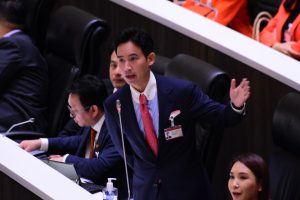Thailand’s Parliament will convene tomorrow for its second round vote to select the country’s next prime minister, with chances fading that Pita Limjaroenrat, whose Move Forward Party (MFP) won the most seats at May’s general election, will manage to gain the necessary support.
During the first vote on July 13, Pita won 324 votes, falling 52 votes short of the majority of 376 needed to become prime minister. Although the MFP-led opposition coalition holds a large majority in the 500-seat lower house, Pita’s candidacy was sunk by the opposition of the 250-member Senate, whose members are appointed by the military and are generally opposed to the MFP’s reformist platform.
A day ahead of the second round vote, it remains unclear whether Pita will be eligible even to be nominated for a second time. Conservative parties including the military-backed Palang Pracharath Party say that doing so would violate parliamentary rules, and House Speaker Wan Muhammad Noor stated today that the Parliament will deliberate on this question before tomorrow’s vote.
Assuming he is permitted to nominate himself, Pita’s chances of success are slim. The party’s very strength – its willingness to advance unapologetically progressive policies – has also earned it the staunch enmity of Thailand’s conservative establishment. These conservatives are particularly leery about the party’s pledge to amend Article 112 of the Thai penal code – the so-called lese-majeste law – which effectively outlaws any criticism of the king or royal family. The capriciously enforced law has been used to clamp down on dissent of various kinds, including the anti-government protests that were held in 2020 and early 2021.
The most obvious source of support for the MFP, the Bhumjaithai party, whose 71 House seats would vault the MFP-led coalition over the 375-seat threshold without the need for Senate support, is unlikely to cross the aisle. During the debate that preceded last week’s vote, Bhumjaithai MP Chada Thaiseth said that his party would have supported Pita’s candidacy if the MFP abandoned its plans to amend the lese-majeste law. But he stated that this offer is no longer on the table. “If they had agreed to back down yesterday, the voting would have already concluded,” he remarked. The Democrats, which hold 25 seats, have also ruled out throwing their support behind the MFP for the same reason. Movement on this front seems unlikely, with Pita holding firm to his pledge to reform Article 112.
For this reason, it is even harder to see how the MFP would manage to win over recalcitrant senators, whose entire raison d’etre is to prevent the accession of a prime minister who might challenge entrenched centers of power and wealth.
Should Pita fail to garner the necessary support, Napon Jatusripitak of Singapore’s ISEAS-Yusof Ishak Institute wrote on Twitter yesterday, it would be “not a reflection of his own shortcomings but rather of the odds stacked against him from the outset – a system rigged to produce either a win for the status quo or a deadlock.”
If Pita fails in the second round, the MFP says that it will table a constitutional amendment, cutting the Senate out of the equation altogether and allowing a prime minister to be elected by a simple House majority. The vote on this amendment is expected to be held next week, ahead of a possible third round vote.
With so many moving parts, it is hard to see what might happen next. It is equally uncertain whether Pita will be allowed to nominate himself for a third ballot, should the second one fail. The MFP leader said yesterday that if he receives 10 percent more votes than on July 13, he should be granted a third chance to gain the necessary support.
But Pita also said that he will withdraw his candidacy if he fails to secure a significant increase in tomorrow’s vote, and if the party does not obtain sufficient support for its constitutional amendment. In that scenario, Pita said that his party would aid the Pheu Thai Party (PTP), which came second in May’s election, in forming the next government with the MFP’s support.
PTP leader Paetongtarn Shinawatra stated today that in this scenario, its chosen nominee would be Srettha Thavisin, a wealthy real estate developer turned politician who is likely to be more palatable to Thai conservatives and business interests than any relative of the fugitive former Prime Minister Thaksin Shinawatra, even though Paetongtarn led the party into its election campaign. (For what it’s worth, Srettha is also the favored candidate of the Bangkok Post’s resident astrologer.)
Should Pheu Thai emerge on top, there would be some irony in pro-military conservatives voting for a party that the military has twice removed from power since the turn of the century. But facing the emergence of the MFP, a party that has displaced the PTP’s mildly redistributionist policies in favor of a more direct challenge to Thailand’s powerful political establishment, it will be no surprise if they chose to flock toward the devil they know.
































